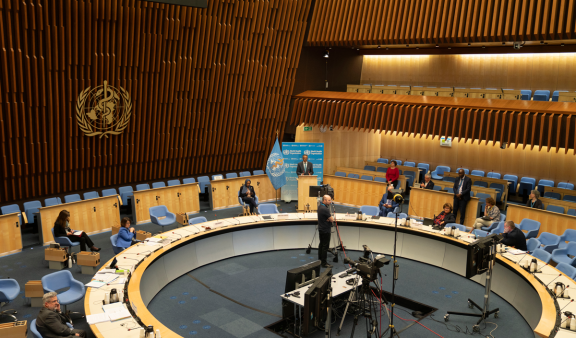FDI calls for the integration of oral health across NCD agenda items at WHO Executive Board
At the 150th WHO Executive Board, FDI supported discussions on the broader NCD agenda and pushed for oral health integration, where appropriate.

The 150th session of WHO’s Executive Board (EB150) took place from 24 to 29 January 2022, where the Board welcomed the updated draft global strategy on oral health and unanimously recommended it to be approved by the World Health Assembly in May. The updated strategy incorporated many recommendations made by FDI in our joint response supported by 65 organizations that also called for the inclusion of oral health considerations across several noncommunicable disease (NCD) agenda items.
The EB150 was used as an occasion to reinforce this messaging, as well support other NCD organizations and the World Health Professions Alliance, to show our solidarity in working together to safeguard the health of global communities.
Ensuring the latest developments on oral health are aligned with the NCD response
FDI partnered with the International Association for Dental Research (IADR) and the NCD Alliance to push for the alignment of the draft outline of the NCD implementation road map 2023–2030 to advance the global action plan for NCD prevention and control (NCD GAP) with the most recent developments on oral health as a core element of the NCD agenda.
While FDI appreciates that the future road map is meant to focus on the existing NCD targets and the “4 by 4” NCD agenda, it can be noted that the current outline stipulates that it will integrate all of WHO’s recommended interventions and technical packages on NCDs. And the updated Appendix 3 of the NCD GAP will also include “best buys” and other recommended interventions on oral health.
Read FDI’s statement with IADR and NCDA on the NCD implementation roadmap
The World Health Professions Alliance (WHPA), comprising of FDI together with the International Pharmaceutical Federation (FIP), International Council of Nurses (ICN), World Physiotherapy and World Medical Association (WMA), also submitted a statement on this agenda item. The statement asked for WHO to recognize that health professionals are the driving force to advance NCD targets and must be therefore engaged in the development and implementation of the NCD implementation road map 2023–2030.
Read WHPA’s statement on the NCD implementation roadmap
More developments needed on alcohol control, and diabetes and obesity prevention and care
FDI has also been working to raise awareness about the two-way relationship between diabetes and periodontal health. People with diabetes have an increased risk of periodontal disease, and treatment of periodontal disease improves blood glucose levels. The prevention and optimal management of diabetes are key to avoiding complications like periodontitis, thus the developments to improve diabetes and obesity prevention and care are relevant for the oral health community.
Obesity prevention is closely linked with increased efforts to reduce sugar consumption as recommended by the WHO guidelines on sugar intake aimed at reducing both unhealthy weight gain and dental caries. The recommended targets on obesity also include an intermediate outcome target, which suggests the implementation of the WHO recommendation to reduce the intake of free sugars to less than 10% of total energy intake in both adults and children.
Last but not least, the WHO Global Alcohol Action Plan was also discussed and approved at EB150 as part of the NCD agenda. FDI supported the statement by Movendi International welcoming this document, raising concerns about industry interference, asking for more resources and monitoring for the action plan, and stronger policies on alcohol taxation and cross-border marketing.
Alcohol policy is a key area for the oral health response as one of the main risk factors for the development of oral cancers, and due to its social implications and association with a higher prevalence of traumatic dental injuries. Oral health professionals can also support by performing brief interventions about alcohol awareness with their patients.
Read Movendi’s statement on the Global Alcohol Action Plan
Protecting and promoting breastfeeding as part of the maternal, infant and young child nutrition agenda
As part of WHO’s reporting exercise on the maternal, infant and young child nutrition agenda, FDI joined the World Cancer Research Fund’s (WCRF) constituency statement to call for the protection and promotion of breastfeeding as a powerful and cost-effective policy to save lives and boost health by protecting children against overweight and obesity, dental caries and diet-related NCDs such as cancer.
Breastmilk substitutes that contain free sugars increase the risk of developing early childhood caries (ECC). As part of this, Member States must adopt and enforce legal measures to strengthen the implementation and monitoring of the International Code of Breast-milk Substitutes Marketing, including strategies to tackle digital marketing.
Read WCRF’s constituency statement on this topic
Ensuring the voice of health professionals is heard at WHO
WHPA submitted two other statements under agenda item 15.1 (Strengthening WHO preparedness for and response to health emergencies) and agenda item 21.2 (WHO reform: involvement of non-State actors in WHO’s governing bodies).
FDI reiterated that a healthy and well-protected health workforce is critical to future pandemic preparedness and response. Under-investment and inaction in this area has resulted in a deterioration of working conditions, professional shortages and service disruptions that have severely impacted on people’s health. Therefore, Members States and WHO must involve health professionals in the way forward.
Read WHPA’s statement on health emergencies’ preparedness and response
Furthermore, FDI asked that civil society organizations, including health professional bodies, are consulted, by following a process similar to that adopted with Member States for the selection of modalities to be used for the engagement of non-State actors (NSAs) in WHO’s governing bodies. This is the only way to encourage a true exchange.
Read WHPA’s statement on NSA involvement in WHO’s governing bodies
Would you like to keep informed of all the latest advocacy and policy news? Sign up to our quarterly newsletter here.
Do you have any questions? Let us know at advocacy@fdiworlddental.org.
